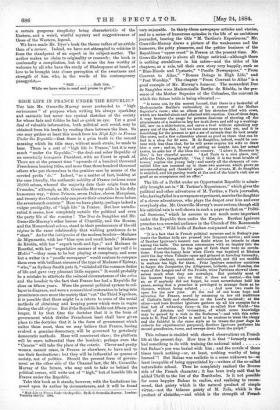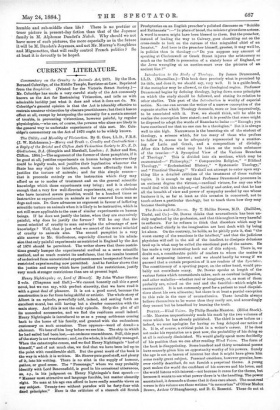HIGH LIFE IN FRANCE UNDER THE REPUBLIC.* TEL late Mr.
Grenville-Murray never pretended to " high seriousness " of purpose when writing his always sparkling and sarcastic but never too cynical sketches of the society for whose fads and foibles he had ao quick an eye. Yet a good deal of valuable information, both political and social, may be obtained from his books by reading them between the lines. So one may gather at least this much from his High Life in France Under the Republic—that there is a grim truth in the second meaning which its title may, without much strain, be made to bear. There is a sort of " high life in France," but it is very much " under the Republic,"—the drab and sober Republic of an essentially bourgeois President, with no Court to speak of. There are at the present time " upwards of a hundred thousand Frenchmen bearing titles, and more than three hundred thousand others who put themselves in the genitive case by means of the coveted prefix de." Indeed, " as a matter of fact, looking at the case literally, the authentic nobility of France reckons some 30,000 scions, whereof the majority date their origin from the Crusades," although, as Mr. Grenville-Murray adds in his drily humorous way, " three Princes, seven Dukes, eleven Marquises, and twenty-five Counts only can prove their creations from before the seventeenth century." Here we have plenty; perhaps indeed a vulgar prodigality, of "high life" in France. But how uninfla- ential it seems, how completely outside the political and even the party life of the country ! The Due de Sangbleu and Mr. Grenville-Murray's other heroes of Chantilly, and the Bourse, and the Monarchical salons, stand to their predecessors of the old rigime in the same relationship that walking gentlemen do to " stars." As for the intrigantes of the modern boudoir—Madame de Mignonette, with her " blue eyes and small hands;" Madame de Reseda, with her " superb teeth and lips ;" and Madame de Rosethe, with her "superlative manner of wearing her ruff a /a Medici"—they seem to be but playing at conspiracy, and none but a writer in a " poodle newspaper" would venture to compare them even with brilliant sinners of the type of Madame d'Epinay, "who," as Sydney Smith puts it, "violated all the common duties of life and gave very pleasant little suppers." It would probably be a mistake to attribute the reduced circumstances of the salon and the boudoir to the fact that France has had a Republic for close on fifteen years. Were the present political system to col- lapse in disgrace, and were a monarchical restoration to bring into prominence once more the society that "cut " the Third Napoleon, it is possible that there might be a return to some of the social methods of obtaining and keeping power which were in vogue daring the old regime. But if the Republic holds out fifteen years longer, if by that time the doctrine that it is the form of government which divides Frenchmen least shall have given place to the doctrine that it is the form of government which unites them most, then we may believe that France, having evolved a genuine democracy, will be governed by genuinely democratic methods. Mass will counteract class ; the platform will be more influential than the boudoir ; perhaps even the " Caucus " will take the place of the coterie. Clever and pretty women cannot cease, in France or elsewhere, to have and to use their fascinations ; but they will be influential as queens of society, not of politics. Should the present form of govern- ment on the other side of the Channel last, the Mr. Grenville- Murray of the future, who may seek to take us behind the political scenes, will write not of " high," but of humble life in France under the Republic.
Take this book as it stands, however, with the limitations im- posed upon its author by circumstances, and it will be found
• High Life in France Under the Republic. By E. C. Grenville-Murray. London: Visetelly and Co. 1894.
very enjoyable. In thirty-three newspaper articles and stories, and in a series of humorous episodes in the life of an ambitions journalist, bearing the title " M. Tartine's Experiences," Mr. Grenville-Murray draws a picture of the weaknesses and the humours, the petty pleasures, and the pettier business of the
Republican "upper crust" in France at the present time. Mr. Grenville-Murray is above all things satirical—although there is nothing atrabilious in his satire—and the titles of his chapters, as a rule, tell their own story very happily, such as " Blue-Bloods and Upstarts," " Poodle Newspapers," " From Convent to Altar," " Bourse Doings in High Life," and "Poet Worship." The chapter "From Convent to Altar " is a good example of Mr. Murray's humour. The monarchist Duo de Sangblen woos Mademoiselle Berthe de Reseda, in the pre- sence of the Mother Superior of the Colombes, the convent in which the future bride is being educated :—
" It turns out, by the merest hazard, that there is a basketful of Mademoiselle Bertha's embroidery in a corner of the Mother Superior's room ; also an album of her sketches filled with cows, which are handed about and admired with emotion. One of these days, it may become the usage for persons desirous of showing off the attainments of a maiden to beg her to it down and add up a washing- bill, sew on a shirt-button, and carve a fowl without splashing any gravy out of the dish ; but we have not come to that yet, and it is something for the present to get a set of animals that do look nearly like cows, and a few collerettes almost as good as those that can be had in a shop for 20 sons. M. de Sangblen, indeed, would be con- tent with less than that, for he will never require his wife to draw him a cow ; and so, by way of getting an insight into her actual tastes, he asks her if she likes the country. I adore it, Monsieur le Due,' is her cheerful answer. ' And Paris is a nice place, too,' adds the Duke, thoughtfully. Yes, I think it is the most lovable of towns,' replies the young lady ; and surely all the elements of con- nubial bliss are summed up in these two answers, which prove an accommodating and thankful spirit. At all events, M. de Sangbleu is satisfied, and his parting words at the end of the hour's visit are as good as an acceptance and an offer."
The life of a Prat under an Opportunist Republic is admir- ably brought out in " M. Tartine's Experiences," which gives the political and other adventures of M. Tartine, a Paris journalist, who, having failed in a newspaper experiment, marries the daughter of a clever adventuress, who plays the despot over him and over everybody else. Mr. Grenville-Murray's more serious, though still his satirical vein is well shown in such a paper as that on " Politi- cal Sermons," which he assures us are much more important under the Republic then under the Empire. Brother Ignivore preaches to a crowded audience in the Church of Ste. Rosemonde on the text, " Wild bulls of Bashan compassed me about :"—
" It is a fact that in French political sermons and in Bishop's pas- torals the Bashan bulls are pressed into frequent service ; and none of Brother Ignivore's bearers can doubt whom he intends to class among the bulls. The sermon commences with an inquiry into the causes of revolutions. In the ages of faith there were no revolu- tions. From the happy hour when Clovis was baptised at Rheims until the day when Voltaire came and grinned at kneeling humanity, men were obedient, contented, well-nourished, and did not meddle in matters too high for them. Friar Ignivore somehow contrives to forget the Jacqueries, the Albigenses, Lollards, and Hussites, the wars of the League and of the Fronde, when Parisians showed them- selves much what they are nowadays. But probably most of his hearers forgot too; so that it does not matter,—tbe lees so, as if anybody did not forget, he must nevertheless hold his peace, seeing that a preacher is privileged to arrange facts as he chooses, without being refuted And now two roads lie open for the new year. At the end of one beam hope and salvation for France, saved by returning to her old traditions of Catholic faith and obedience to the Lord's anointed; at the other—and here Brother Ignivore gathers up all his energies for a final bolt of withering force—is the so called New world—'the world of Atheism and vivisection, of which some knowledge may be gained by a visit to the Sorbonne '—and with this refer- ence to M. Paul Bert (who is said to be anxious to treat the clergy and the faithful in the same style as be treats the poor dogs he collects for experimental purposes), Brother Ignivore performs his second genuflexion, turns, and sweeps down from the pulpit."
This volume is studded with shrewd observations on French life at the present day. How true it is that " formerly novels
had something to do with training the national mind • but Balzac's pen was buried with him ; and the novels of these times teach nothing—or, at least, nothing worthy of being learned "! But Balzac was realistic in a sense unknown to—at least incapable of being appreciated by—writers of the so-called naturalistic school. Thus he completely realised the Bourse side of the French character ; it has been truly said that be added Thrift to the list of the Beatitudes. Is it not possible for some happier Balzac to realise, and realising to recom- mend, that gaiety which is the natural product of simple virtue,—not the hideous gaiety of M. Zola, which is the
product of absinthe,—and which is the strength of French humble and sub-middle class life P There is no prettier or truer picture in present-day fiction than that of the Joyeuse family in M. Alphonse Daudet's Nabob. Why should we not have more of such pictures, the more especially as in the future it will be M. Daudet's Joyenses, and not Mr. Murray's Sangbleus and Mignonettes, that will really control French politics ? So at least it is devoutly to be hoped.

































 Previous page
Previous page